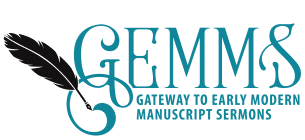Richard Snoddy; Benjamin Durham; David Robinson
ODNB (Article: 26526)
Born at Cranborne, Dorset on 17 April 1635 to Samuel Stillingfleet and Susanna Norris. Educated at Cranborne Grammar school and at Ringwood, Hampshire before entering St John's College, Cambridge in 1649. Graduated BA in 1653 and elected to a fellowship. MA, 1656; DD, 1668. Secretly ordained by Richard Brownrigg, deprived bishop of Exeter and appointed to the rectory of Sutton, Bedfordshire in 1657. Married Andrea, daughter of William Dobyns of Dumbleton in 1659, with whom he had three children; two daughters who died in infancy, and a son also called Edward who became Gresham professor of physic in 1698. He later married Elizabeth, daughter of Sir Nicholas Pedley, serjeant-at-law. They had seven children, but only two survived to adulthood. After the restoration, he was appointed to posts at the Temple Church and at Serjeants' Inn. Vacated Sutton in 1665 for St Andrew, Holborn which he held until 1689 where he became a renowned preacher, so much so that Samuel Pepys reported that on 9 May 1669, he 'could not get a place at St Andrews' (Pepys, Diary, 6.87 and 9.548). He was also a prolific author, publishing works of church history and polemic. His first book, A Weapon Salve for the Church's Wounds (1659), known as the Irenicum advocated compromise with presbyterians. His 1662 Origines sacrae was a defence of Christiniaty generally, while his 1665 A Rational Account of the Grounds of Protestant Religion defended Protestantism specifically. His reputation allowed him to advance in the ecclesiastical hierarchy, receiving prebend of Islington at St Paul's in 1667, exchanged for Newington in 1672. Residentary canon of St Paul's in 1672. Receiver and chamberlain in 1674. Chaplain to the king around this time. Archdeacon of London, 1677-1689. Dean of St Paul's in 1678. Opponent of James II's 1687 Act of Indulgence in favour of comprehension of dissenting Protestants into the Church of England. In 1689, he was appointed bishop of Worcester by William III and formed part of a commission of ten bishops to draw up proposals for comprehension. In his final years, he engaged John Locke in controversy over the doctrine of the Trinity. He died 27 March 1699.
